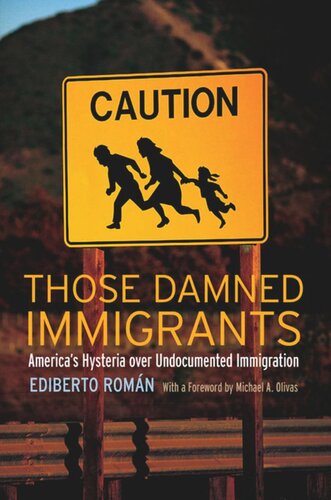

Most ebook files are in PDF format, so you can easily read them using various software such as Foxit Reader or directly on the Google Chrome browser.
Some ebook files are released by publishers in other formats such as .awz, .mobi, .epub, .fb2, etc. You may need to install specific software to read these formats on mobile/PC, such as Calibre.
Please read the tutorial at this link: https://ebookbell.com/faq
We offer FREE conversion to the popular formats you request; however, this may take some time. Therefore, right after payment, please email us, and we will try to provide the service as quickly as possible.
For some exceptional file formats or broken links (if any), please refrain from opening any disputes. Instead, email us first, and we will try to assist within a maximum of 6 hours.
EbookBell Team

5.0
50 reviewsExposes the false narratives at the heart of Americans' fear of Latino/a immigration
The election of Barack Obama prompted people around the world to herald the dawning of a new, postracial era in America. Yet a scant one month after Obama’s election, Jose Oswaldo Sucuzhanay, a 31-year old Ecuadorian immigrant,
was ambushed by a group of white men as he walked arm and arm with his brother. Yelling anti-Latino slurs, the men beat Sucuzhanay into a coma. He died 5 days later.
The incident is one of countless attacks—ranging from physical violence to raids on homes and workplaces to verbal abuse—that Latino/a immigrants have confronted for generations in America. And these attacks—physical and otherwise—are accepted by a substantial number of American citizens and elected officials, who are virulently opposed to immigrant groups crossing the Mexican border. Quick to cast all Latino/a immigrants as illegal, opponents have placed undocumented workers at the center of their anti-immigrant movement, and as such, many different types of native Spanish-speakers in this country (legal, illegal, citizen, guest), have been targeted as being responsible for increasing crime rates, a plummeting economy, and an erosion of traditional American values and culture.
In Those Damned Immigrants, Ediberto Román takes on critics of Latina/o immigration, drawing on empirical evidence to refute charges of links between immigration and crime, economic downfall, and a weakening of Anglo culture. Román utilizes government statistics, economic data, historical records, and social science research to provide a counter-narrative to what he argues is a largely one-sided public discourse on Latino/a immigration.